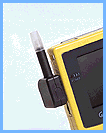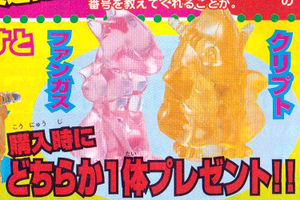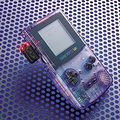Power Antenna: Difference between revisions
No edit summary |
(I'd rather add a clipped picture than ref but all of those pages are cluttered with words...) |
||
| Line 1: | Line 1: | ||
[[File:powerantenna.gif|thumb|right|Animation of the Telefang 1 Power Antenna in use]] | [[File:powerantenna.gif|thumb|right|Animation of the Telefang 1 Power Antenna in use]] | ||
The '''Power Antenna''' {{lang|jap=パワーアンテナ}} is a Game Boy peripheral which plugs into a Game Boy, Game Boy Color, or Game Boy Advance. The antenna is intended to make the console look somewhat like a [[D-Shot]]. Two versions of the Power Antenna were included in Limited-edition copies of [[Telefang 1]] and [[Telefang 2|its sequel]]. Included with copies of [[Bugsite]] was a functionally identical item, called the '''Bug Sensor''' {{lang|jap=バグセンサー}}. | The '''Power Antenna''' {{lang|jap=パワーアンテナ}} is a Game Boy peripheral which plugs into a Game Boy, Game Boy Color, or Game Boy Advance. The antenna is intended to make the console look somewhat like a [[D-Shot]]. Two versions of the Power Antenna were included in Limited-edition copies of [[Telefang 1]] and [[Telefang 2|its sequel]]. Included with copies of [[Bugsite]] was a functionally identical item, called the '''Bug Sensor''' {{lang|jap=バグセンサー}}. | ||
The February 2000 issue of {{w|Comic Bom Bom}} featured a prototype version of the Telefang 1 antenna, which appears to have been attached to the game cartridge itself.<ref>http://s7.postimage.org/u8dwy11k9/tele120002.jpg</ref> | |||
==Availability== | ==Availability== | ||
| Line 18: | Line 20: | ||
[[File:Powerantenna-figures.jpg|thumb|right|The figures as they appeared in Comic Bom Bom]] | [[File:Powerantenna-figures.jpg|thumb|right|The figures as they appeared in Comic Bom Bom]] | ||
===Power Antenna Mascot Figures=== | ===Power Antenna Mascot Figures=== | ||
Small coloured plastic figures of [[Crypto]] and [[Fungus]], intended to fit onto the antenna's light, were included as an early purchase incentive for Telefang 1 at certain stores. Adverts for the figures were shown in issues of | Small coloured plastic figures of [[Crypto]] and [[Fungus]], intended to fit onto the antenna's light, were included as an early purchase incentive for Telefang 1 at certain stores. Adverts for the figures were shown in issues of Comic Bom Bom around the time of the game's release, and detailed the stores that ran the promotion. These stores were {{w|Ito-Yokado}}, {{w|JUSCO}}, {{w|Toys"R"Us}}, {{w|Daiei}}, {{w|Uny|Uny/Apita}} and [http://ja.wikipedia.org/wiki/%E3%83%81%E3%83%A8%E3%83%80 Hello Mac].<ref>http://imageshack.us/photo/my-images/513/tele1ad200010part2.jpg/</ref> | ||
===Telefang 2 Power Antenna Stickers=== | ===Telefang 2 Power Antenna Stickers=== | ||
Revision as of 18:22, 22 February 2012

The Power Antenna () is a Game Boy peripheral which plugs into a Game Boy, Game Boy Color, or Game Boy Advance. The antenna is intended to make the console look somewhat like a D-Shot. Two versions of the Power Antenna were included in Limited-edition copies of Telefang 1 and its sequel. Included with copies of Bugsite was a functionally identical item, called the Bug Sensor ().
The February 2000 issue of Comic Bom Bom featured a prototype version of the Telefang 1 antenna, which appears to have been attached to the game cartridge itself.[1]
Availability
While Telefang 1 was later re-released in an "unlimited" edition which did not include the peripheral, neither Bugsite nor Telefang 2 ever had an unlimited release. Promotional versions of the Telefang 2 model were made available with purchases of Dino Device 1 at certain stores. The peripherals were never sold separately from the games.
Features
The item's effect is entirely cosmetic, and has no influence on gameplay. Plugging into the link cable port of the console, its antenna will flash when the player receives a call (Telefang), uses the ingame Bug Sensor (Bugsite), receives a message or during certain in-battle scenarios (Dino Device). Due to the fact that it utilizes the link port, it cannot be used concurrently with linked play.
Compatibility
There is no difference between the three versions of the peripheral besides physical appearance, and they are interchangeable between the games that support them. The Telefang 2 Power Antenna is incompatible with Game Boy / Game Boy Color systems due to notches on the peripheral that are meant to match up to a Game Boy Advance, but it can still be used with Telefang 1 or Bugsite if those games are played in an Advance system.
Dino Device 1 is compatible with the peripheral, despite not having its own version of the device.
Game Boy micro is incompatible with any model of Power Antenna, due to having a differently-shaped link port than a regular Game Boy Advance.
Promotions

Power Antenna Mascot Figures
Small coloured plastic figures of Crypto and Fungus, intended to fit onto the antenna's light, were included as an early purchase incentive for Telefang 1 at certain stores. Adverts for the figures were shown in issues of Comic Bom Bom around the time of the game's release, and detailed the stores that ran the promotion. These stores were Ito-Yokado, JUSCO, Toys"R"Us, Daiei, Uny/Apita and Hello Mac.[2]
Telefang 2 Power Antenna Stickers
A set of stickers used to decorate the Telefang 2 Power Antenna came with the May 2002 issue of Comic Bom Bom. Some of the stickers were designed based on either the Speed or Power version so that the antenna could be decorated based on a particular version. On the back of the sticker sheet there is an advert detailing how to use the stickers.[3][4][5]
Gallery
-
Telefang 2 Power Antenna up close
-
Telefang 2 Power Antenna attached to a Game Boy Advance
-
Bugsite Bug Sensor attached to a Game Boy Color
-
Bugsite Bug Sensor attached to a Game Boy Advance
External Links
- Telefang 1 Power Antenna at Rocket Company
- Bug Sensor at Rocket Company
- Telefang 2 Power Antenna at Rocket Company
References
- ↑ http://s7.postimage.org/u8dwy11k9/tele120002.jpg
- ↑ http://imageshack.us/photo/my-images/513/tele1ad200010part2.jpg/
- ↑ http://s15.zetaboards.com/Tulunk_Village/single/?p=8209086&t=515453
- ↑ http://s15.zetaboards.com/Tulunk_Village/single/?p=8209320&t=515453
- ↑ http://s15.zetaboards.com/Tulunk_Village/single/?p=8209323&t=515453



